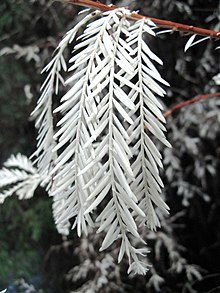
An albino redwood is a redwood tree which is unable to produce chlorophyll, and has white needles instead of the normal green. It survives by obtaining sugar through the connections between its roots and those of neighboring normal redwood(s), usually the parent tree from whose base it has sprouted. Sap exchange through roots is a general phenomenon among redwoods. About 400 are known. They can be found in Henry Cowell Redwoods State Park, Humboldt Redwoods State Park, San Francisco Botanical Garden, Huddart Park, and The Santa Lucia Preserve, with eleven trees in the first. The exact locations are not publicized to protect the rare trees. They reach a maximum height of about 20 m (66 ft). Other conifers lack the ability to graft their roots, so 'albino' mutants of other species do not survive to become sizable trees.
The trees were important to Native Americans and were recorded in their legends. For example, the Pomo people used them in their cleansing ceremonies.
Albino redwoods are generally regarded as parasitic plants, but as of 2016 one researcher speculates that they are supported by other trees for their role in storing toxic heavy metals. Albinos apparently accumulate more metals than normal trees because of defective stomata, which cause them to lose more water through transpiration, forcing them to compensate by taking up more water through their roots. Any species of vascular plant has the potential to inherit and express albinism, but only redwoods can produce enough nutrients (through the host/parent tree) to survive past the seedling stage.
Six phenotypes of albino redwood have been classified: white, bright yellow, cellular virescent green, pale green, mottled and nonchimeric variegated. Such mutants can be either basal (growing from a burl at the base of a tree) or aerial (branching off from a tree above the ground). The bright yellow form is exclusively aerial and is thought to be associated with excess xanthophyll production. The pale green form lacks just one specific type of chlorophyll and is almost always basal. Cellular virescent green trees have a few normal cells (whose abundance may vary over time) interspersed among the mutant cells.
Ten cases are known of chimeric redwoods that have a mosaic of albino and normal tissues. Only a single chimeric redwood is known to produce cones. Formerly threatened by the Sonoma–Marin Area Rail Transit rail development, it has since been replanted.
Three phenotypes of chimeric redwoods have been noted: sectorial, mericlinal and periclinal. In sectorial mutants, albino cells are present vertically through all cell layers, with genotype boundaries usually parallel to the stem. Mericlinal trees have mutant cells in only some cell layers and have an unstable phenotype; the albino cells can disappear and reappear in successive years. A periclinal chimera has both mutant and normal cells distributed horizontally across the tip of each bud propagating at equal rates, leading to a very stable phenotype.
Gallery
-
 An 'albino' redwood in Humboldt Redwoods State Park, northern California
An 'albino' redwood in Humboldt Redwoods State Park, northern California
-
 Another example in Humboldt Redwoods State Park
Another example in Humboldt Redwoods State Park
-
 Albino foliage in the Santa Cruz Mountains, California
Albino foliage in the Santa Cruz Mountains, California
-
 Example in the Santa Cruz Mountains
Example in the Santa Cruz Mountains
-
 Example of an Albino Redwood tree in Montgomery Redwood State Reserve
Example of an Albino Redwood tree in Montgomery Redwood State Reserve
See also
Notes
- Albinism is defined in various ways; see Albinism in biology
References
- ^ Stienstra, T. (October 11, 2007). "It's no snow job - handful of redwoods are rare albinos". San Francisco Chronicle. Archived from the original on August 31, 2009. Retrieved December 6, 2010.
- Krieger, L. M. (November 28, 2010). "Albino redwoods hold scientific mystery". San Jose Mercury News. Archived from the original on May 19, 2021. Retrieved November 23, 2012.
- Welsh, J. (December 8, 2010). "A Creepy Monster of the Forest: The Albino, Vampiric Redwood Tree". Discover Magazine. Archived from the original on September 6, 2019. Retrieved May 18, 2021.
- ^ Kaplan, S. (October 7, 2016). "The mystery of the 'ghost trees' may be solved". Washington Post. Archived from the original on October 10, 2016. Retrieved May 19, 2021.
- Watts, Jamison. "2021: A Year of Growth and Change". SLConservancy.org. Santa Lucia Conservancy. Retrieved 28 February 2022.
- Bauer, C. (August 26, 2010). Albino Redwoods, Ghosts of the Forest: Science on the SPOT. YouTube (video). KQED. Retrieved May 18, 2021.
- "Albino redwoods a winter treat". Humboldt County California's Redwood Coast. Humboldt County Convention & Visitors Bureau. Archived from the original on May 27, 2015. Retrieved January 25, 2015.
- Stapleton, T. (January 18, 2015). "Mutation Types: Albino Redwoods". ChimeraRedwoods.com. Archived from the original on October 12, 2016. Retrieved October 8, 2016.
- Fimrite, P. (March 19, 2014). "Cotati residents, scientists scramble to save albino redwood". San Francisco Chronicle. Archived from the original on March 23, 2014. Retrieved March 23, 2014.
- Fernandez, L. (March 14, 2014). "California Arborist Fights to Save Tallest Albino Redwood Chimera Tree in Wine Country". NBC Bay Area. Archived from the original on May 27, 2015. Retrieved January 25, 2015.
- "Rare Chimeric Redwood Tree In Cotati Replanted After Being Moved From Railroad Tracks". CBS SF Bay Area. August 8, 2014. Archived from the original on May 27, 2015. Retrieved February 15, 2015.
- Stapleton, T. (January 22, 2015). "Mutation Types: Chimeric Redwoods". ChimeraRedwoods.com. Archived from the original on October 12, 2016. Retrieved October 8, 2016.
Additional reading
- Davis, D. F.; Holderman, D. F. (February 1, 1980). The white redwoods: ghosts of the forest. Naturegraph Publishers. ISBN 978-0-87961-088-3.
External links
- Chimera Redwoods web site
- Albino Leaves in Sequoia sempervirens Shows Altered Anatomy and Accumulation of Heavy Metals Symposium Poster